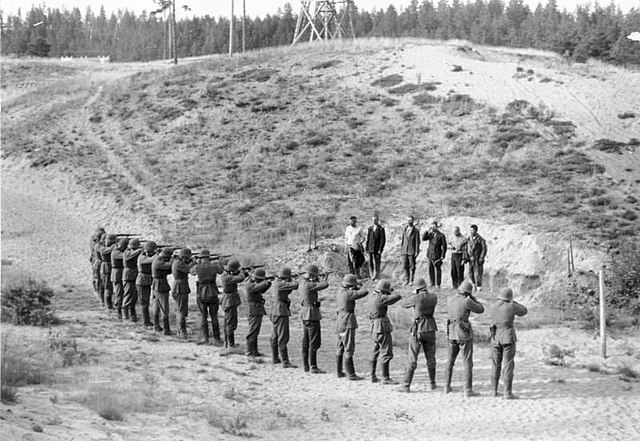Erich von dem Bach-Zelewski
Erich Julius Eberhard von dem Bach-Zelewski was a high-ranking SS commander of Nazi Germany of Kashubian-Polish origin. During World War II, he was in charge of the Nazi security warfare against those designated by the regime as ideological enemies and any other persons deemed to present danger to the Nazi rule or Wehrmacht's rear security in the occupied territories of Eastern Europe. It mostly involved atrocities against the civilian population. In 1944, he led the brutal suppression of the Warsaw Uprising. Despite his responsibility for numerous war crimes and crimes against humanity, Bach-Zelewski did not stand trial in the Nuremberg trials, and instead appeared as a witness for the prosecution. He was later convicted for politically motivated murders committed before the war and died in prison in 1972.
Erich von dem Bach-Zelewski
Bach-Zelewski in Minsk in 1943
Photos taken by the Polish Underground showing the bodies of women and children killed during the Warsaw Uprising, August 1944.
In German military history, Bandenbekämpfung, also referred to as Nazi security warfare during World War II, refers to the concept and military doctrine of countering resistance or insurrection in the rear area during wartime with extreme brutality. The doctrine provided a rationale for disregarding the established laws of war and for targeting any number of groups, from armed guerrillas to civilians, as "bandits" or "members of gangs". As applied by the German Empire and later Nazi Germany, it became instrumental in the crimes against humanity committed by the two regimes, including the Herero and Nama genocide and the Holocaust.
Heinrich Himmler's report Number 51 from 1 October 1942 to 1 December 1942 detailing the murder of "bandits" and Jews in Southern Russia, Ukraine, and the Bialystok District
A depiction of the execution of Belgian civilians by German troops at Blegny in August 1914 during the Rape of Belgium
Execution of alleged partisans by German troops, September 1941
German soldiers relaxing after destroying a village in Epirus, Greece (1942 or 1943)







